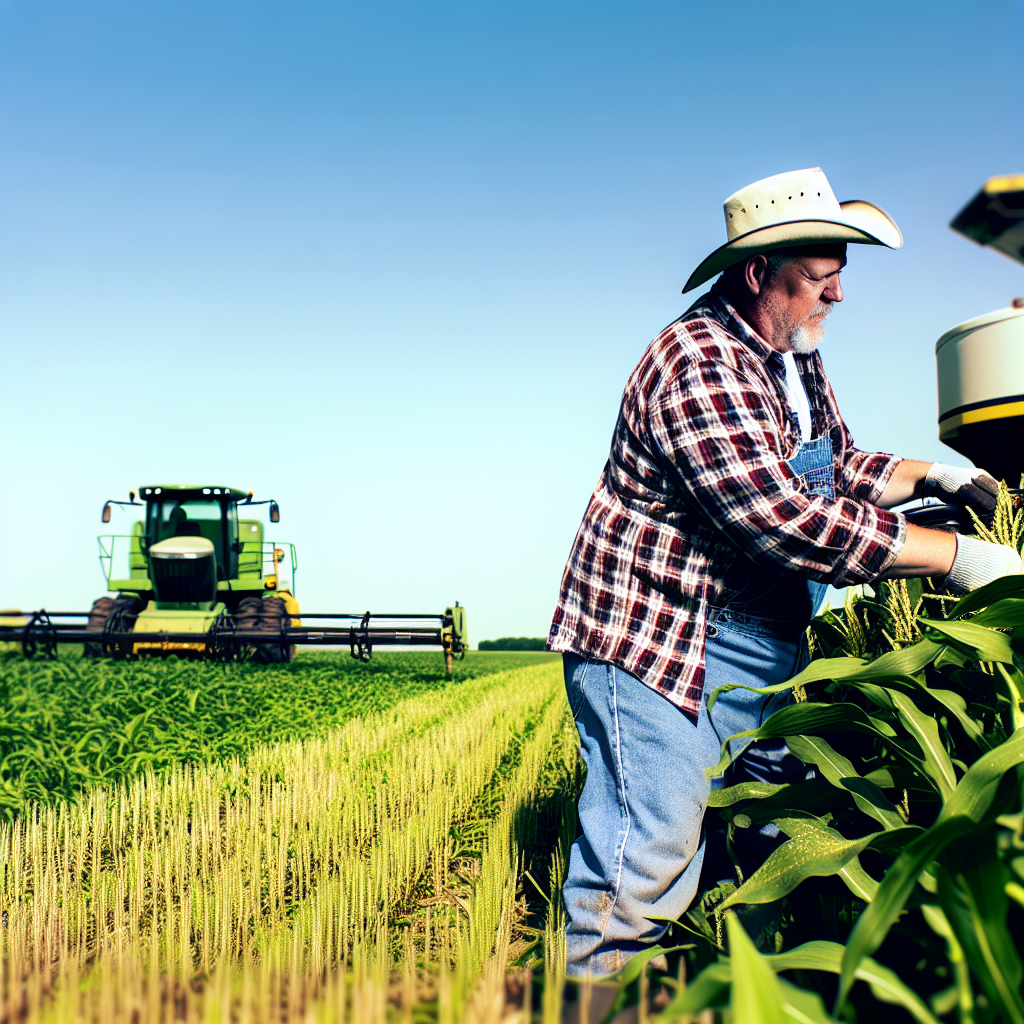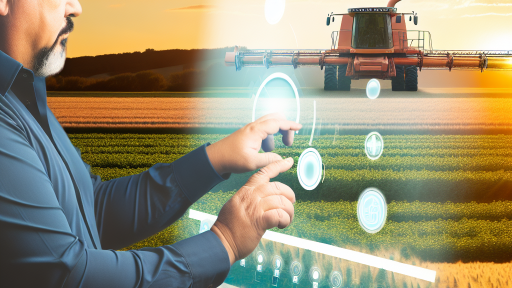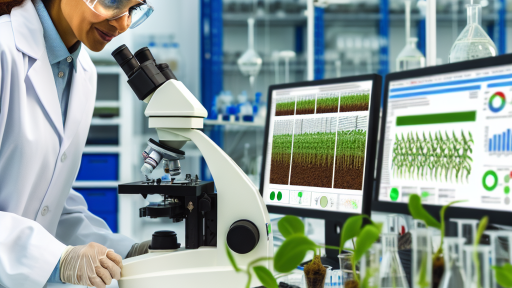Introduction to Sustainable Farming Practices
Defining Sustainable Farming
Sustainable farming focuses on producing food while preserving environmental resources.
This method integrates agricultural practices that enhance ecological health.
It emphasizes efficiency, biodiversity, and soil conservation.
Importance of Sustainable Practices
Sustainable practices improve food security for current and future generations.
They help mitigate climate change and promote resource conservation.
Moreover, they support local economies and enhance farmer resilience.
Role of Technology in Sustainable Farming
Modern technology plays a vital role in sustainable farming.
Innovations enhance crop yields and minimize resource use.
For instance, precision agriculture optimizes inputs like water and fertilizers.
Consequently, farmers can reduce costs and environmental impacts.
Challenges in Implementing Sustainable Farming
Despite its benefits, sustainable farming faces various challenges.
Access to technology may be limited for some farmers.
Additionally, education and training are crucial for effective implementation.
Finally, market demand for sustainable products can fluctuate.
Overview of Genetically Modified Crops
Introduction to GM Crops
Genetically modified crops, often called GM crops, are plants altered through biotechnology.
Transform Your Agribusiness
Unlock your farm's potential with expert advice tailored to your needs. Get actionable steps that drive real results.
Get StartedThey possess specific traits not found in the natural gene pool.
These modifications allow crops to endure various environmental stressors.
Farmers utilize GM crops to enhance agricultural efficiency.
Benefits of GM Crops
GM crops offer numerous advantages for sustainable farming.
They reduce the need for chemical pesticides significantly.
This reduction helps in protecting beneficial insects and soil health.
Additionally, GM crops can tolerate drought conditions better.
This resilience supports farmers in regions facing water scarcity.
Moreover, they increase overall crop yields, maximizing land use.
Common Types of GM Crops
Several crop varieties have been genetically modified globally.
- Corn is one of the most widely cultivated GM crops.
- Soybeans are also extensively modified for herbicide resistance.
- Rice has been engineered to enhance nutritional content.
- Cotton is modified to resist various pests and diseases.
Regulatory and Safety Considerations
The development and use of GM crops are heavily regulated.
Government agencies assess potential health and environmental risks.
These regulations ensure they do not adversely affect biodiversity.
Ongoing research further evaluates the long-term impacts of GM crops.
Safety protocols are critical in maintaining public trust in biotechnology.
Public Perception and Challenges
Public opinion on GM crops varies widely across regions.
Many embrace the technology for its potential benefits.
Conversely, some critics express concerns about food safety.
These differing views highlight the need for transparent information.
Education can help bridge the gap in understanding GM technology.
Benefits of Combining Sustainable Practices with GM Crops
Enhanced Crop Yields
GM crops often exhibit improved resistance to pests and diseases.
This trait can lead to significant increases in crop yields.
Farmers experience more reliable harvests year after year.
Higher yields contribute to food security in a growing global population.
Showcase Your Farming Business
Publish your professional farming services profile on our blog for a one-time fee of $200 and reach a dedicated audience of farmers and agribusiness owners.
Publish Your ProfileReduced Chemical Usage
Sustainable farming practices prioritize reduced chemical inputs.
GM crops designed for pest resistance minimize pesticide applications.
This reduction benefits the environment and local ecosystems.
Farmers also save money on chemical purchases over time.
Improved Soil Health
Planting GM crops can enhance soil health through crop rotation.
These crops can contribute to better nutrient cycling in the soil.
Additionally, reduced tillage practices associated with GM crops help protect soil structure.
Healthy soil supports greater biodiversity and water retention.
Adapting to Climate Change
GM crops can be engineered for tolerance to drought and extreme temperatures.
This capability prepares farmers for changing weather patterns.
Consequently, farmers can maintain productivity even under stress.
Such adaptability is crucial for the future of global agriculture.
Economic Benefits
Combining GM crops with sustainable practices boosts farm profitability.
Higher yields and lower input costs lead to better income for farmers.
Additionally, it increases market competitiveness for sustainable products.
Economic viability encourages more farmers to adopt these practices.
Discover More: Reducing Supply Chain Fraud Through Blockchain For Farmers
Case Studies: Successful Implementation of GM Crops in Sustainable Farming
Introduction to GM Crops and Sustainability
Genetically modified (GM) crops play a significant role in sustainable farming.
They enhance agricultural productivity while reducing environmental impact.
Many farmers worldwide have adopted GM crops to improve sustainability.
In this section, we explore specific case studies demonstrating their effectiveness.
Case Study: Green Valley Farms
Green Valley Farms, located in Iowa, has successfully integrated GM corn and soybeans.
By using drought-resistant varieties, they have reduced water usage significantly.
This approach has enhanced their resilience to climate change conditions.
Additionally, they experienced a marked increase in crop yields.
Consequently, this farm has maintained profitability while preserving natural resources.
Benefits Observed
- Improved crop resilience to pests and diseases.
- Higher yields compared to non-GM crop varieties.
- Reduced dependency on chemical pesticides.
Case Study: Eco Harvest Agriculture
Eco Harvest Agriculture implements GM cotton in their operations in Texas.
This choice has minimized the use of harmful insecticides significantly.
As a result, they have improved soil health and reduced chemical runoff.
The implementation of these practices supports local ecosystems.
This farm has also reported increased profitability due to reduced costs.
Positive Impacts on the Local Environment
- Enhanced biodiversity in surrounding fields.
- Improved soil structure and fertility.
- Lower levels of harmful substances in local water sources.
Case Study: Rural Innovations Inc.
Rural Innovations Inc. has focused on GM rice cultivation in Southeast Asia.
Their use of biofortified rice varieties has addressed local malnutrition issues.
These crops provide essential nutrients, improving community health.
In addition, they have adopted sustainable farming practices alongside GM crops.
The result has been a healthier population and more sustainable agricultural systems.
Socioeconomic Benefits
- Increased food security for local communities.
- Higher incomes for local farmers through improved crop value.
- Enhanced educational programs on sustainable practices.
Future Directions for GM Crops
These case studies illustrate the successful implementation of GM crops.
They demonstrate the potential to achieve sustainability in farming.
Farmers can effectively balance productivity with environmental stewardship.
Looking forward, further research can enhance the benefits of GM technology.
Showcase Your Farming Business
Publish your professional farming services profile on our blog for a one-time fee of $200 and reach a dedicated audience of farmers and agribusiness owners.
Publish Your ProfileCollaboration among farmers, scientists, and policymakers is essential.
Uncover the Details: Drone Applications For Pest And Disease Control
Potential Risks and Controversies Surrounding GM Crops
Health Concerns
The safety of genetically modified (GM) crops is a hotly debated issue.
Some studies suggest potential health risks from consuming GM foods.
For instance, allergic reactions could occur in certain individuals.
Moreover, the long-term effects on human health remain largely unknown.
Further research is crucial to understand these potential impacts.
Environmental Impacts
GM crops can significantly affect ecosystems and biodiversity.
Firstly, they may lead to the decline of non-target species.
Secondly, there is concern about cross-contamination with non-GM crops.
This contamination can affect organic farming practices negatively.
Additionally, over-reliance on a few GM crops can reduce genetic diversity.
Economic Factors
The adoption of GM crops can create economic disparities among farmers.
Large agribusinesses often control the technology behind GM crops.
This control can lead to increased costs for smallholder farmers.
Furthermore, patenting of GM seeds can restrict farmers’ rights.
Ultimately, this can limit access to essential agricultural resources.
Public Perception and Ethical Issues
Public opinion on GM crops is divided and often influenced by misinformation.
Some people strongly oppose GM technology for ethical reasons.
Concerns regarding ‘playing God’ with nature are prevalent.
Furthermore, transparency in labeling GM products is a contentious issue.
Consumers demand more information regarding the products they purchase.
Explore Further: Integrating Agri-Fintech Technologies For Smarter Farm Management

Economic Impacts of Sustainable Farming with GM Technology
Sustainable farming practices employing GM technology can significantly increase crop yields.
This increase occurs due to enhanced resistance to pests and diseases.
Moreover, farmers can achieve more productive use of land and resources.
Cost Efficiency
Adopting GM crops can lead to lower production costs.
This reduction results from improved pest resistance and reduced pesticide use.
Additionally, farmers spend less time and money on weed control.
Market Opportunities
GM crops create new market opportunities for farmers.
Specialty crops developed through GM technology can meet niche market demands.
This approach enhances farmers’ income streams and profitability.
Long-term Sustainability
Sustainable farming practices contribute to long-term economic security.
Improved soil health promotes sustainability and productivity over time.
Farmers can reduce dependency on chemical inputs, benefiting both the environment and profits.
Risk Management
GM technology can help farmers manage agricultural risks more effectively.
Crops engineered for drought resistance minimize the impact of climate change.
This resilience supports stable yields and protects farmers’ investments.
Community and Global Impacts
Adopting sustainable farming with GM crops boosts local economies.
Job creation in agriculture is a direct benefit of increased production.
Showcase Your Farming Business
Publish your professional farming services profile on our blog for a one-time fee of $200 and reach a dedicated audience of farmers and agribusiness owners.
Publish Your ProfileAdditionally, sustainable practices contribute to food security on a global scale.
Delve into the Subject: How Genetically Modified Crops Improve Farm Yields
Role of Technology and Innovation in Sustainable Farming
Advancements in Genetically Modified Crops
Genetically modified (GM) crops significantly enhance agricultural productivity.
These crops require fewer resources while delivering higher yields.
Moreover, they are engineered to withstand pests and diseases effectively.
This resilience reduces the need for chemical pesticides, benefiting the environment.
Precision Agriculture Techniques
Precision agriculture employs technology to improve farming efficiency.
Farmers use data analytics to make informed decisions about crop management.
This technique optimizes input usage, such as water and fertilizers.
As a result, it leads to higher yields with minimal environmental impact.
Impact of Sustainable Farming Technologies
Sustainable farming technologies promote better soil health over time.
By utilizing cover crops and crop rotation, farmers restore nutrient levels.
This approach enhances biodiversity, positively affecting ecosystems.
Additionally, it helps mitigate climate change by sequestering carbon in soil.
Collaboration and Knowledge Sharing
Farmers, scientists, and agribusinesses must collaborate for progress.
Sharing knowledge about successful practices accelerates innovation.
Organizations like AgTech Innovators lead initiatives to connect stakeholders.
Such partnerships advance research and promote sustainable solutions.
Future Trends in Sustainable Farming Practices with GM Crops
Integration of Advanced Technologies
The integration of precision agriculture technologies is on the rise.
Farmers will increasingly utilize drones and sensors.
These tools will help in monitoring crop health efficiently.
Additionally, data analytics will enhance decision-making processes.
Farms will become more productive and resource-efficient.
Development of Climate-Resilient Crops
Scientists are focused on creating climate-resilient GM crops.
These crops will withstand extreme weather conditions effectively.
Farmers will benefit from improved yields in challenging climates.
This advancement supports global food security goals.
Moreover, environmentally friendly practices will gain importance.
Enhanced Biodiversity and Ecosystem Services
With GM crops, biodiversity will be promoted on farms.
Diverse crop rotations will become standard practice.
This approach can foster healthier ecosystems.
Farmers will see benefits in pest management and soil health.
Consequently, sustainable practices will be integrated into traditional farming.
Focus on Sustainable Agriculture Supply Chains
Sustainable supply chains will become a focal point in agriculture.
Traceability and transparency are key components.
Consumers will demand responsibly sourced GM crops.
Companies will need to adapt to these changing consumer preferences.
This shift will promote stronger partnerships among stakeholders.
Education and Community Engagement
Education around sustainable farming practices will expand.
Farmers will engage with local communities to share knowledge.
Showcase Your Farming Business
Publish your professional farming services profile on our blog for a one-time fee of $200 and reach a dedicated audience of farmers and agribusiness owners.
Publish Your ProfileWorkshops and training programs will foster collaboration.
Additionally, schools will introduce agriculture-focused curricula.
These efforts will encourage future generations in sustainable practices.
Additional Resources
The Environmental Impact of Genetically Modified Crops – Health …




